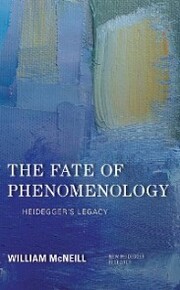Detailansicht
The Fate of Phenomenology
E-Book
Format: EPUB
DRM: Adobe DRM
- Zusatztext
-
It can be easily argued that the radical nature and challenge of Heideggers thinking is grounded in his early embrace of the phenomenological method as providing an access to concrete lived experience (or factical life, as he called it) beyond the imposition of theoretical constructs such as subject and object, mind and body. Yet shortly after the publication of his groundbreaking workBeing and Time, Heidegger appeared to abandon phenomenology as the method of philosophy. Why? Heidegger was conspicuously quiet on this issue. Here, William McNeill examines the question of the fate of phenomenology in Heideggers thinking and its transformation into a thinking of Being that regards its task as that of letting be. The relation between phenomenology and letting be, McNeill argues, is by no means a straightforward one. It poses the question of whether, and to what extent, Heideggers thought of his middle and late periods still needs phenomenology in order to accomplish its taskand if so, what kind of phenomenology. What becomes of phenomenology in the course of Heideggers thinking?
-
- Kurztext
- In this important new book, leading Heidegger scholar William NcNeill provides a concise and systematic appraisal of the fate of phenomenology in Heidegger. He shows how the issue of "letting be" is already central and prominent in Heidegger¿s early phenomenology and examines Heidegger¿s phenomenological approach in relation to art and poetry.
- Autorenportrait
-
William McNeill is professor of philosophy at DePaul University. He is the author ofThe Glance of the Eye: Heidegger, Aristotle, and the Ends of Theory andThe Time of Life: Heidegger andthosand has translated several of Heideggers works into English.
-
